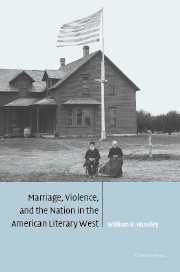Book contents
- Frontmatter
- Contents
- List of illustrations
- Acknowledgments
- Introduction
- 1 Western unions
- 2 Turner's rhetorical frontier
- 3 Marrying for race and nation: Wister's omniscience and omissions
- 4 Polygamy and empire: Grey's distinctions
- 5 Unwedded West: Cather's divides
- 6 Accident and destiny: Fitzgerald's fantastic geography
- 7 Promises and betrayals: Joan Didion and Wallace Stegner
- Afterword
- Notes
- Index
3 - Marrying for race and nation: Wister's omniscience and omissions
Published online by Cambridge University Press: 22 September 2009
- Frontmatter
- Contents
- List of illustrations
- Acknowledgments
- Introduction
- 1 Western unions
- 2 Turner's rhetorical frontier
- 3 Marrying for race and nation: Wister's omniscience and omissions
- 4 Polygamy and empire: Grey's distinctions
- 5 Unwedded West: Cather's divides
- 6 Accident and destiny: Fitzgerald's fantastic geography
- 7 Promises and betrayals: Joan Didion and Wallace Stegner
- Afterword
- Notes
- Index
Summary
If men and women do not marry, and if there are not sufficient children to a marriage, the race will in a short time vanish – surely any one can see this … [T]here is no form of happiness on the earth, no form of success of any kind, that in any way approaches the happiness of the husband and wife who are married lovers and the father and mother of plenty of healthy children.
Theodore Roosevelt, 1911[N]othing would have induced me to unite him to the little Vermont person … I wouldn't have let him live & be happy; I should have made him perish in his flower & in some splendid and somber way.
Henry James to Owen Wister, responding to the ending of The VirginianOwen Wister was not a very happy man. Yet his most famous novel, The Virginian, has a happy ending: the nomadic, bachelor cowboy known as the Virginian gets married to his sweetheart from Vermont, Molly. Wister wrote to his mother shortly after The Virginian appeared that the novel's “‘whole raison d'être’” was its “‘nationality.’” With this sense of national consequence, the novel is plot-driven to the altar of marriage. Regionally identified with New England and the South, Molly Stark and the Virginian marry out West in Wyoming, and their union caps, among other things, the novel's extended polemic about the state of democracy in the American Union.
- Type
- Chapter
- Information
- Publisher: Cambridge University PressPrint publication year: 2002



